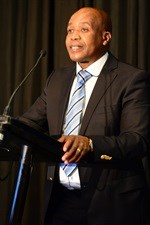
Top stories

ICTToo little, too concentrated: why AI startup funding in Africa needs rethinking
Claire Zanuso 7 hours





More news



ESG & Sustainability
Redisa calls on govt to fix South Africa’s “broken” waste management system























Dr Voges was speaking at the annual congress of the Master Builders South Africa which was held in Port Elizabeth from 21-23 September.
"Government cannot create economic growth - only private sector investment can. However, government must create a conducive and positive investment climate through public sector infrastructure investment and programmes."
As a result of the MBDA's R500m investment in urban renewal projects, business confidence has grown by 66%, new business sales to the tune of R548.1m has been generated, 1,667 jobs have been created and there has been a R178.8m increase in additional GDP.

Eastern Cape Premier, Phumulo Masualle, said since the mid 2000's, government has placed increasing emphasis on economic infrastructure such as ports, rails, dams and power stations. "Over the past five years, investment in this infrastructure has dramatically increased. However, many challenges continue to persist. Only 24% of the built environment professionals are black and only 9% are females. Projects still take far too long to complete. High profile cases of alleged overpricing in relation to leases and renovations of government properties where there is collusion with industry players needs to stop."
Mninawa Ngcobo, training manager at the National Home Builder Registration Council, said the South African built industry has been experiencing a mixed bag of business conditions during the fourth quarter of 2013 and the first and second quarter of 2014.
"The industry remains key to support the country's infrastructural development requirements despite the financial challenges of the previous years. The government's infrastructure development plan and the 'new' Presidential Infrastructure Coordinating Commission are positive signs for future growth in the industry. However, the current reality is indicating that shortage of skills supply and the increasing unemployment figures remain pressing concerns in the current South African economy and the built environment is no exception," Ngcobo said.
Some of the remedies that he put forward for addressing the dilemma in skills development in construction included increasing access to training and skills development opportunities, the fundamental transformation of inequalities linked to class, race, gender, age and disability as well as integrating linkages between institutional and workplace learning.
Thabo Masombuka, CEO of the Construction Sector Charter Council, stated that BEE shouldn't be a compliance issue - it should be a way of doing business. "In October 2013, the Department of Trade and Industry (DTI) gazetted and published a set of revised Codes of Good Practice and gave industry up until 30 April 2015 to align and comply. All sector Codes must be aligned by this time. Currently workshops are underway to discuss the five elements and once meetings have been held we need to be ready to submit the new look Construction Sector Code by 30 October 2014."